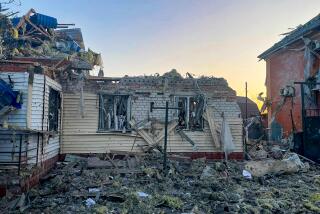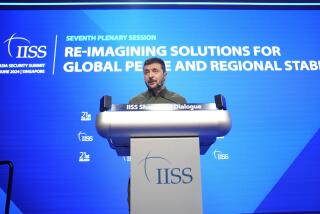China Backs Russia on Chechen War
- Share via
BEIJING — Russian President Boris N. Yeltsin won China’s backing for his war in Chechnya on Friday as Russian forces prepared to bomb and shell the separatist republic’s capital even though as many as 40,000 civilians still live there.
Concluding two days of talks in Beijing, Yeltsin and Chinese President Jiang Zemin issued a communique recognizing the territorial integrity of each other’s nation.
“The Chinese side reaffirms that the Chechen question is purely Russia’s internal affair,” the agreement said, adding that Beijing backs Moscow’s “actions to strike at terrorist and separatist forces.”
Yeltsin, who lashed out at President Clinton a day earlier for his criticism of the war in Chechnya, returned Friday to Moscow and the quiet of his country estate.
Russia sent its troops into Chechnya in October in a bid to recover from its defeat in the 1994-96 Chechen war and retake the mountainous territory. Moscow has branded the rebels “terrorists” and blamed them for the bombings of apartment buildings that killed about 300 people in September.
Using massive firepower, the 100,000 Russian troops in Chechnya have consolidated their hold on the lowlands as the rebels have pulled back toward the Caucasus Mountains in the south.
Chechen President Aslan Maskhadov, who has been leading the military resistance to Russia, was reported to have slipped out of Grozny, the Chechen capital, despite Russia’s claim that its forces have surrounded the city.
Russia has given civilians in Grozny until today to leave or risk death when massive shelling and bombing of the city begin. Moscow has not specified when the attacks will begin, but its warning has drawn strong criticism from Clinton and European leaders.
On Friday, at a summit of European Union leaders in Helsinki, Finland, the 15-nation bloc condemned Russia’s bombardment of Chechen cities and its treatment of the entire population as terrorists. The leaders also warned Moscow that much of the alliance’s $170-million-plus annual budget for aid and cooperative programs with Russia is at dire risk unless Moscow ceases its “totally unacceptable” behavior in Chechnya.
“I don’t think any of our citizens in the European Union think we can proceed with Russia on the basis of business as usual,” said external affairs commissioner Chris Patten, noting that EU budget talks are set for next week and as much as $140 million of the earmarked aid could be at stake for Moscow.
EU officials conceded, however, that they were unsure what, if any, immediate influence their appeal would have on Moscow.
Yeltsin showed little sign of concern Friday morning as he and Jiang strolled arm in arm through the gardens of the Diaoyutai State Guest House before winding up their informal talks. Later, China and Russia issued the communique detailing their call for a “multipolar world” and criticizing U.S. attempts at hegemony in world affairs.
The communique deplored the “use of pretexts such as human rights and humanitarian intervention to harm the independence of sovereign states.” Instead, China and Russia insisted on a stronger role for the United Nations in resolving global disputes.
The document expressed “deep regret” at the U.S. Senate’s rejection of the Comprehensive Nuclear Test Ban Treaty and called on Washington to abide by the 1972 Antiballistic Missile Treaty.
In the visit’s most obvious payoff for both sides, Russia and China exchanged support for the other’s territorial concerns. In return for China’s backing of the Chechen war, Russia praised “the great cause of China’s reunification” and denounced Taiwan’s recent assertion that ties between Taipei and Beijing constitute “state-to-state” relations. China considers Taiwan a renegade province.
China and Russia also agreed that U.S. research into an antimissile system to defend Asian-based troops “would sabotage the region’s peace and stability.”
As world leaders waged their war of words, Russian forces continued to attack Grozny with bombs and rockets.
U.N. officials in Geneva said they are growing increasingly concerned about Grozny’s civilians, especially the elderly and disabled. Ron Redmond, a spokesman for the Office of the U.N. High Commissioner for Refugees, said few people have fled Grozny through a corridor into Russian-controlled territory left open by the army.
Estimates of the number of civilians remaining in Grozny reach as high as 40,000, although the Russian government contends that as few as 10,000 remain in the city, which has been without electricity, gas and water for weeks.
Russian Prime Minister Vladimir V. Putin, arriving in Uzbekistan on Friday for a two-day visit, said he understands Western nations’ concern about the Chechen conflict but has no intention of deviating from Moscow’s plan to eliminate “terrorists.”
“Russia understands and shares the justified concern of the world community and the European Union over the humanitarian situation in the North Caucasus,” he said. “The goals that we have fixed--the destruction of terrorism in Russia--will be achieved.”
*
Times staff writer Paddock reported from Moscow and special correspondent Kuhn from Beijing. Times staff writer Carol J. Williams contributed to this report from Helsinki.
More to Read
Sign up for Essential California
The most important California stories and recommendations in your inbox every morning.
You may occasionally receive promotional content from the Los Angeles Times.













